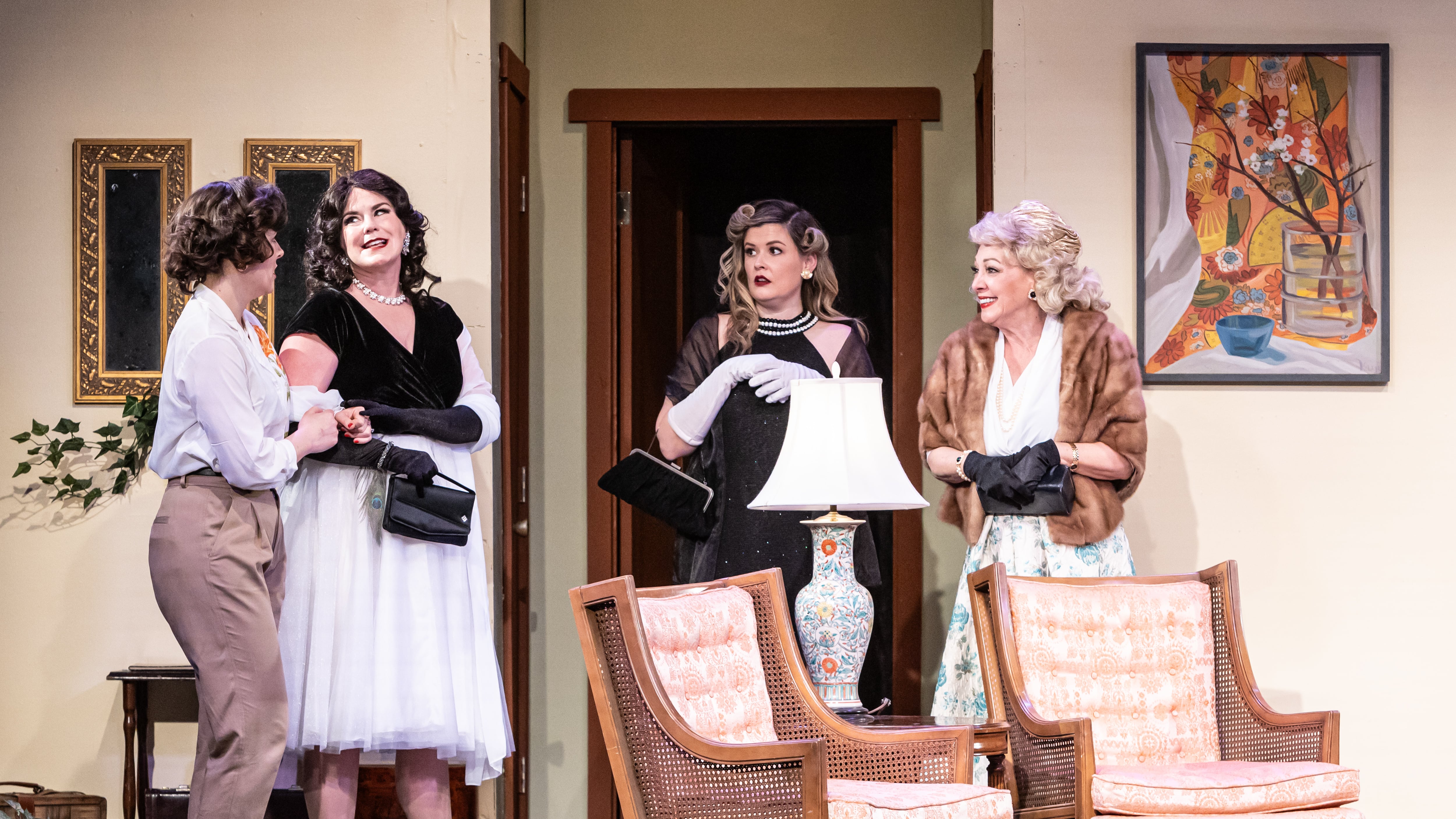At times, Perfect Arrangement, directed by Don Horn at Triangle Productions, is a manic merry-go-round ride, with a blur of comic characters running in and out of doors. Beneath the high jinks, though, the play is about people who are running for their lives.
Topher Payne’s brilliant 2013 blend of farce and drama takes place in 1950, on the heels of Sen. Joseph McCarthy’s Red Scare, an attack on communists and other so-called security risks. One minute, Bob (Ben Lawrence) and Norma (Lauren Allison), two U.S. State Department employees, are laughing uproariously at a cocktail party, and the next, their boss (Joe Healy) is giving them a new task: to root out the “deviants,” or “gentlemen who prefer the company of gentlemen,” among their ranks.
With Norma’s secretarial assistance, Bob dutifully gets 91 employees fired in just three weeks. Little does their boss know that Bob and Norma have their own secret: They’re both gay and married to each other’s partners, Millie (Christina Holtom) and Jim (Alex Fox). What’s more, the two couples share a duplex connected by a special closet that gives them easy access to their real loves.
Payne’s plot is based on a largely untold story from U.S. history—the Lavender Scare, which ruined thousands of American lives as government employees suspected of being gay were fired or forced to resign. Unable to find jobs elsewhere, some chose suicide.
In a brisk 90-minute show with no intermission, the cast dazzles as they constantly pivot from tense debates about the ethics of the witch hunt to performing increasingly frantic, sitcom-style antics to keep their “perfect arrangement” intact.
Millie bears the brunt of this seesaw lifestyle when Kitty (Michelle Maida), the wife of Bob’s boss, latches on to her. In their conversations, Millie energetically extols the virtues of hand cream and cleaning products to distract her probing companion from the truth. In private, though, she quietly comforts a conscience-stricken Norma who’s grown sick of casting aspersions on her co-workers. Allison, too, makes Norma’s weariness palpable when she says, “Always another plate to spin. The show must go on.” Likewise, Fox drops his jovial persona when Jim says he’ll lose his job as a teacher—and be arrested—if the couples are outed.
In a show where appearance and reality are at odds, the play takes place in what seems to be Bob and Millie’s living room, but really belongs to Millie and Norma. Horn’s spot-on set design resembles a page from a 1950s Ladies’ Home Journal, with midcentury furniture and fussy bric-à-brac, including a bowl of fake grapes—possessions Millie cares for with humorous fastidiousness.
Before the first line is spoken, Millie is onstage dusting tables and carefully setting out trays of canapés for the cocktail party. The male characters dismiss her and the other women as “hens,” but she’s well aware that her attention to domestic details helps the foursome keep their cover. When Kitty asks her if Norma’s house is clean, Millie instantly gets the subtext: Any woman who doesn’t maintain a sparkling abode is morally defective.
Payne’s writing credits include five scripts for the Hallmark Channel, including Rome in Love and My Summer Prince, and he’s more than equipped to engage audiences with an entertaining story while also exploring issues that lurk beneath its shiny surface. The play expands on the idea of discrimination, for example, when Norma and Millie judge a State Department translator (Melissa Whitney) for her open sexuality. Jim and Bob, too, joke about a man at Bob’s office who sports an ascot and a limp wrist. In the play, as in life, anyone can be a target of pernicious othering.
As Norma and Millie are gradually drawn away from their perfect home and into a life of activism, they talk about “when things are better.” They can’t foresee that the ban on security clearances for gay federal employees would last until 1995, and today some U.S. Supreme Court justices are sympathetic to businesses that discriminate against same-sex couples.
Horn, who started Triangle 34 years ago, adds a final note of hope in the costumes he and his cast created for the show. At first, the female characters are dressed in confining frocks and perfectly polished pumps. By the end of the play, Norma and Millie have settled into pants and sneakers, suggesting they’re finally more comfortable with themselves…or maybe just too tired to keep up the artifice anymore.
SEE IT: Perfect Arrangement plays at Triangle Productions, 1785 NE Sandy Blvd., 503-239-5919, trianglepro.org. 7:30 pm Thursday–Saturday, through April 20. $15–$35.
